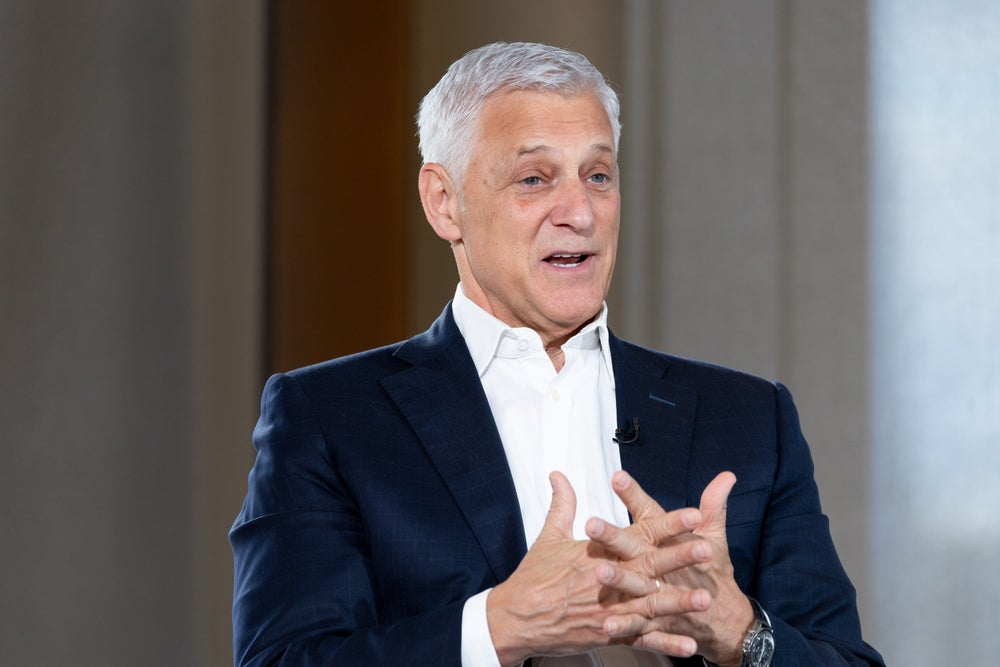Bill Winters, the CEO of 160-year-old bank Standard Chartered, says that the MBA he earned from the University of Pennsylvania Wharton School of Business was a “waste of time” — but the humanities undergraduate degree he received from Colgate University was more worth it.
In an interview that aired earlier this week, Bloomberg’s Francine Lacqua asked Winters, 63, what he would recommend for young people to study. Winters responded by saying that he studied international relations and history as an undergraduate, graduating in 1983. He recommended those fields, stating that majoring in those areas taught him “how to think.”
But his MBA from Wharton in 1988 was unnecessary, he said.
“I got an MBA later, but that was a waste of time,” Winters told Bloomberg. “I learned how to think at university. For the 40 years since I left university, those skills have been degraded, degraded, degraded.”
Related: Goldman Sachs CIO Says Coders Should Take Philosophy Classes — Here’s Why
Winters explained that critical thinking skills are “coming back” and becoming more important in the workforce now because AI is taking over tasks on the technical side.
“I really think in the age of AI that it’s critical that you know how to think and communicate,” Winters said.
He clarified that communication doesn’t mean to act like ChatGPT and churn out answers, but to know an audience and anticipate their needs with curiosity and empathy. Technical skills are being needed “less and less,” Winters said.
 Bill Winters. Photographer: Jason Alden/Bloomberg via Getty Images
Bill Winters. Photographer: Jason Alden/Bloomberg via Getty Images
Winters started his career at JPMorgan in 1983, rising over nearly three decades to become the co-CEO of JPMorgan’s investment bank. He was considered a potential successor to JPMorgan CEO Jamie Dimon, but was ousted by Dimon in October 2009. He started his own fund management business, Renshaw Bay, in 2011 and joined Standard Chartered as CEO in 2015.
Related: Using ChatGPT? AI Could Damage Your Critical Thinking Skills, According to a Microsoft Study
Winters isn’t the only executive encouraging the study of the humanities. Goldman Sachs’ Chief Information Officer, Marco Argenti, wrote in a post in the Harvard Business Review last year that engineers should take philosophy classes in addition to standard engineering courses. That’s the advice he gave his college-age daughter who was thinking about what to study.
Meanwhile, big tech companies are rapidly adopting AI in their operations as the technology sweeps over technical skills. AI generates about 30% of new code at Google and Microsoft, and up to half of software development within the next year at Meta.
“Vibe coding,” or having AI code entire apps and projects based on prompts, is also on the rise. Even Google CEO Sundar Pichai stated earlier this month that he had used AI coding assistants to “vibe code” a webpage in his spare time.
Bill Winters, the CEO of 160-year-old bank Standard Chartered, says that the MBA he earned from the University of Pennsylvania Wharton School of Business was a “waste of time” — but the humanities undergraduate degree he received from Colgate University was more worth it.
In an interview that aired earlier this week, Bloomberg’s Francine Lacqua asked Winters, 63, what he would recommend for young people to study. Winters responded by saying that he studied international relations and history as an undergraduate, graduating in 1983. He recommended those fields, stating that majoring in those areas taught him “how to think.”
But his MBA from Wharton in 1988 was unnecessary, he said.
The rest of this article is locked.
Join Entrepreneur+ today for access.

